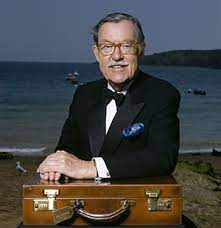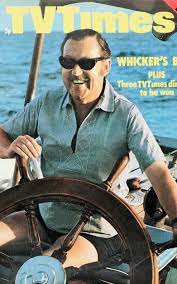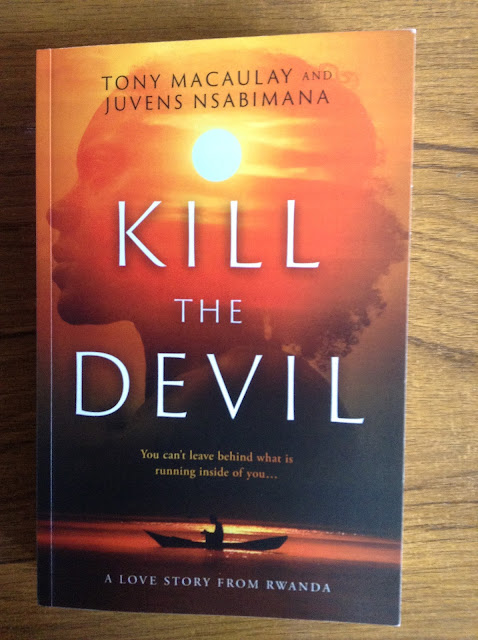JOURNALIST & BROADCASTER ALAN WHICKER (2.AUG 1921 - 12 JULY 2013
I wrote this profile of Alan Whicker a couple of years ago. Reprinting on his birthday.
Today, celebrity travelogues on television are ten-a-penny. Prior to this deluge, Michael Palin ruled the globe as the most popular presenter of such programmes, starting in 1989 with Around the World in 80 days. Prior to Palin, there was the legendary Alan Whicker, still considered by the older generation as master of the genre. At his peak it is said he travelled 100,000 miles a year and each travelogue was watched on television by around 15 million viewers.
There is some confusion about his birth year, but most sources have stated 2 August, 1925. He was born to British parents in Cairo and raised in Richmond, Surrey. He was a commissioned officer in the Second World War, joining the Army Film and Photographic Unit in 1943. After the war he chose a career in journalism and broadcasting, skills that led him to join the BBC’s Tonight programme in 1957 as a roving reporter. One of his reporting assignments included a series of eight short films on life in Northern Ireland. One film was shown but the other seven were not. But more of that later.
Tonight was an early evening television magazine beginning in 1957 that covered the arts, topical matters and reports from around the UK and beyond, a mixture of serious reportage and light-hearted items. The main presenter was the professional and totally relaxed Cliff Michelmore. The team included names such as Fyfe Robertson, Kenneth Allsop, Julian Pettifer, Brian Redhead and, of course, Alan Whicker. Music featured too, with Cy Grant singing calypso and Robin Hall and Jimmy Macgregor singing folk songs.
The programme was Whicker’s launching pad. Amongst all of his presenting colleagues, he was the one who made the biggest career leap when he was given the chance to front a series called Whicker’s World. For Tonight, he had made films from places like Hong Kong, Japan, Singapore, Hawaii and Mexico. From 1965 to 1994, his full-length globetrotting programmes were hits from the outset.
His appearance and casual delivery combined to form his distinctiveness amongst broadcasters – thick spectacles, neat moustache, blazer and a voice that would not have been out of place in a posh gentleman’s club. All of this was lampooned beautifully in 1972 by the Monty Python team as each comedian impersonated Whicker in a location dubbed Whicker Island.
Apart from the locations, he covered subjects like alternative healing, anonymous societies, the Monaco Grand Prix, Italian private investigators, the making of You Only Live Twice, the ups and downs of comedians, the beauty industry, San Francisco hippies, Fleet Street, guns in Texas, cruising, the Orient Express, and dozens more diverse subjects. On several Ireland visits, he kissed the Blarney Stone, reported from Nelson’s Column in Dublin, pre-demolition, and chatted to a Kerry man who operated as a romantic matchmaker, earning a percentage of dowries and a few grand hotel dinners.
But of all the places he visited, Whicker in Belfast for the BBC in 1959 caused outrage. For the Tonight show, he filmed eight short pieces to reflect life in Belfast and beyond. But only one was ever shown on television. To this day, the other seven episodes have never seen the light of day.
The Open Democracy site records that back in those days, unionist politicians were very suspicious of “mainland” reporters, but BBC producers maintained the right to broadcast freely within their own policy standards. The only broadcast film showed scenes of Belfast bars, betting shops, sectarian graffiti and armed police. Tourist board officials, senior politicians, business leaders, newspaper editors and others were reported to be incandescent with rage at what they saw as an unbalanced picture of Northern Ireland life.
In an episode of Anderson on the Box, a television chat show presented by Gerry Anderson, Whicker recalled: “There was such uproar. All I had done was arrive in a place and state the obvious. But in those days, there were certain things you couldn’t say whether they were true or not. I wasn’t happy about it.”
In his book, Within Whicker’s World, he recalls watching the film in a Belfast hotel lounge with other guests and at the end, one man told him there were things he should not have shown or said. Whicker replied that everything was true and the man responded by saying: “But that doesn’t matter!” Whicker maintained that the other seven films would have balanced things up, but it was not to be. It was certainly one of the strangest chapters in an illustrious, award-winning career.





Comments
Post a Comment